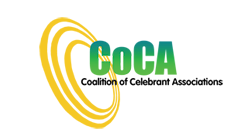SUMMARY
The First Consultation for the Review of Celebrancy Training was held in January 2013.
A Diploma In Professional Celebrancy was circulated for public comment.
- Approximately 2/3 rds of the Feedback was positive to the upgrading of the Cert IV to a Diploma.
- 4/10 Registered Training Organisations were supportive of a Diploma even though the longer and more costly training would be likely to reduce the number of people training to be new marriage celebrants.
- Likewise the Attorney-General's Department was cautious to support the full Diploma for authorisation of new marriage celebrants as this would require a change to the Marriage Regulations and could increase the Regulatory Burden.
- The remaining comments that were not supportive of a Diploma were the Australian Federation of Civil Celebrants (AFCC) and from individual celebrants who thought the qualification was intended for marriage appointments.
Things to know:
The Attorney-General's Department has never required existing celebrants to upgrade to the latest appointment qualification.
Even since training was required for appointment in 2003, existing marriage celebrants have not been required to upgrade their qualification.
This qualification is intended all ceremonies and independent celebrants, not just for marriage celebrants.
Evidence for celebrants' training needs for a broader range of ceremonies, than just weddings, was identified from
- A review of the latest population and other trends of a changing profession, and the
- 2012 Celebrante Survey - the latest independent survey of celebrants
The Attorney-General's Department can choose a full qualification or part of a qualficiation for appointment
From 2003 to 2010 the Attorney-General's Department required only one unit of a Certificate IV in Marriage Celebrancy for appointment.
The AGD could nominate the full Diploma or part of the Diploma for marriage celebrants appointment (eg 6 or 7 units would be approximately half of the Diploma and equivalent in cost of a Certificate IV).
For example:
Core units
• Establish client celebrancy needs
• Work with diverse people
• Develop sustainable celebrancy practice
Marriage electives
• Establish and maintain marriage celebrancy practice
• Interview clients and plan marriage ceremonies
• Prepare for, present and evaluate marriage ceremonies
- Part of the Diploma would not increase the Regulatory Burden and only require the Regulations to be changed to "Competencey Units as required by the Attorney-General'"
- Part of a Diploma would then provide more in-depth and broader training than is possible under the Certificate IV in Celebrancy and enable those celebrants wanting to offer a range of other ceremonies to complete more units for a Diploma level qualification.T
The Second Consultation on the Review of Celebrancy Training will commence on the 15th April 2015.
Subject Matter Expert Group participants were the Skills Council, representatives of CoCA Associations (ACMCV, ACQ, AMC, CAI, CCGA, CCN and ICCA), FCAA (Funeral Celebrants Australia Association), AFCC (Australian Federation of Civil Celebrants) and the Attorney-General's Department.
The working members of the Subject Matter Expert Group from the CoCA associations and from the Funeral Celebrants Australia Association (FCAA) attended two face-to-face meeting (Nov 2014 and Feb 2015), did extensive work on units between meetings and presented their recommendations for a Diploma Qualification in Celebrancy in February 2015.
The CoCA + FCAA (not AFCC) recommendations included the following units:
Core: Research, create and evaluate ceremonial elements
Core: Use writing skills for celebrancy practice
Core: Develop presentation and performance skills for celebrancy
Core: Identify needs, and set up and maintain resources for professional celebrancy practice
Elective: Plan, provide and review celebrancy services related to loss and grief
(Note: The rationale for this unit is that the Funeral Industry Units are not appropriate for independent celebrants who are not employed by the funeral industry)
Due to the Skills Council's lack of resources, the skills of the new units above needed to be incorporated into these Core units:
- Establish client celebrancy needs
- Research, design and organise ceremonies
- Prepare for, present and evaluate ceremonies
- Develop sustainable celebrancy practice
The AGD attended the November SMEG meeting and participated for 2 hours by teleconference in the February SMEG meeting. The AGD worked separately with the Skills Council to develop these three Marriage units:
- CHCCEL005 Establish and maintain marriage celebrancy practice
- CHCCEL006 Interview clients and plan marriage ceremonies
- CHCCEL007 Prepare for, present and evaluate marriage ceremonies,
The AFCC offered its apologies for the Nov 2014 and Feb 2015 SMEG, providing verbal feedback via the Skills Council Project Officer, the key points being:
- AFCC does not see the need to raise the level of the qualification to Diploma level
- Main issue it sees is the need for ensuring better grounding in legal requirements, responsibilities and process
- Absolute need for good presentation skills
- 99% of members do weddings, though there are specialist funeral celebrants; even the funeral industry seeks people with broader celebrancy skills / qualification
- quality of delivery an issue – must be a requirement that a person can show they can deliver to a group
Outcome for Second Public Consultation:
The CoCA + FCAA (not AFCC) representatives submitted detailed and well evidenced submissions as to the need for higher qualifications. Whilst the AGD does not the legislative authority to determine the level of the qualification for other ceremonies, the AGD :
- considers the existing Certificate IV in Celebrancy to be adequate for authorisation as a Commonwealth Marriage Celebrants
- was concerned the full Diploma would be a Regulation Burden on the Industry and thus be against current government regulation policy.
- was concerned a part Diploma would not be supported by Registered Training Organisations or potential new marriage celebrants.
Without agreement within the SMEG, the Skills Council has decided to put the Qualification out without a level to ask the industry and training organisations for their feedback.
Our CoCA association representatives ask you to support their analysis that there is a need for broader and more in-depth training for ceremonies other than marriage.
Click here for CoCA association representatives specific recommendations
Click here for CoCA Diploma Proposal & Possible Qualification for Public Comment
Click here for Principles for planning celebrancy training


